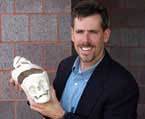
Troy Hershberger, director of product development for hips and computer assisted surgery for Biomet Inc. of Warsaw, Ind., will deliver the first talk in the University of Notre Dames Distinguished Engineering Lecture Series for the 2004-05 academic year. TitledEngineering and Orthopedics: Examples of Engineerings Contributions to the Advancement of Human Health,the presentation is scheduled for 12:50 p.m. Nov. 5 (Friday) in the DeBartolo Hall auditorium. It is free and open to the public.p. During his presentation, Hershberger will discuss how engineering is used in the design and development of orthopedic implants — such as hip, knee and shoulder joints — as well as in the replacement of massive amounts of bone lost through cancer-related illnesses. He will review unique case histories and detail ongoing efforts to develop a suitable replacement material to repair the skulls of the recently separated Egyptian conjoined twins.p. Hershberger also will share events from his career, which led him to discover a field where engineering is used to make a difference in the lives of others.p. A mechanical engineering graduate from Purdue University, Hershberger is a 17-year veteran of the orthopedic industry. He has worked for two of the largest companies in the industry — Zimmer Inc. and Biomet — and has served as a developmental engineer, business development manager, product manager, and engineering director.p. He also has designed numerous orthopedic implants and surgical instrumentation systems and holds 13 U.S. patents in the field.p. The Distinguished Engineering Lecture Series exposes students to engineers who have achieved at the highest levels in their specific fields. Speakers from various disciplines are featured throughout each academic year to give students an overview of the diverse opportunities available in engineering and to provide them with a better understanding of the role of engineering in society and the impact they, as engineers, can have.
TopicID: 7785